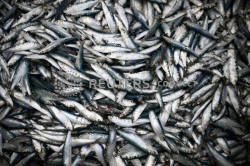UK-EU trade slumps in first month of new Brexit rules
 Send a link to a friend
Send a link to a friend
 [March 12, 2021] By
Andy Bruce [March 12, 2021] By
Andy Bruce
LONDON (Reuters) - Trade between the United
Kingdom and the European Union was hammered in the first month of their
new post-Brexit relationship, with record falls in British exports and
imports of goods as COVID-19 restrictions continued on both sides.
British goods exports to the EU, excluding non-monetary gold and other
precious metals, slumped by 40.7% in January compared to December, the
Office for National Statistics said on Friday. Imports fell by 28.8% -
another record.
The ONS said the COVID-19 pandemic, which left Britain under lockdown
measures in January, made it hard to quantify the Brexit impact from new
customs arrangements, and there were changes in the way data was
collected too.
But there were still signs of a Brexit hit.
Trade in chemicals was especially weak, reflecting the winding-down of a
rush to stockpile pharmaceuticals ahead of the end of the Brexit
transition period, the ONS said.

The ONS highlighted a 64% fall in exports of food and live animals to
the EU - including shellfish and fish.
It pointed to delays caused by red tape reported by the Scottish Seafood
Association, with consignment sign-offs reportedly taking six times
longer.
"External evidence suggests some of the slower trade for goods in early
January 2021 could be attributable to disruption caused by the end of
the transition period," the ONS said.
Many companies stockpiled goods in late 2020 to avoid any disruption,
deepening the fall in trade in January.
The ONS said its separate business survey suggested that trade picked up
towards the end of the month.
Britain on Thursday delayed the introduction of a range of post-Brexit
import checks on goods from the EU by around six months, saying
businesses needed more time to prepare because of the impact of the
pandemic.
[to top of second column] |

Sardines are landed at Newlyn Harbour, which will see significant
impact to the fishing industry as a result of the Brexit deal due to
be implemented in the New Year, in Newlyn, Britain, December 29,
2020. REUTERS/Tom Nicholson

FTA CHANCE
Prime Minister Boris Johnson says Britain's new independent trade policy means
it can focus on deals with faster-growing economies around the world, although
many trade analysts are sceptical that this boost will outweigh lost EU trade.
Britain's official budget forecaster says the country's new trade arrangements
with the EU, the world's biggest single market, will erode its long-run
productivity by 4% compared with staying in the bloc.
"This month's unique combination of factors made it inevitable that we would see
some unusual figures this January," said David Frost, a senior minister who was
Johnson's chief Brexit negotiator.
Economists say the hit to EU trade - and any benefits from Brexit - will become
clearer.
"While some of the non-tariff barriers to trade, such as the increase in red
tape and form-filling, will be ironed out in the short term, the combination of
COVID-19 and Brexit will ultimately prove to be a long-term drag on growth,"
said Ana Boata, head of macroeconomic research at trade credit insurer Euler
Hermes.
Britain's overall goods trade deficit, including non-EU countries, narrowed to
9.826 billion pounds ($13.70 billion) in January from 14.315 billion pounds in
December.
($1 = 0.7172 pounds)
(Reporting by Andy Bruce; Editing by William Schomberg and Catherine Evans)
[© 2021 Thomson Reuters. All rights
reserved.] Copyright 2021 Reuters. All rights reserved. This material may not be published,
broadcast, rewritten or redistributed.
Thompson Reuters is solely responsible for this content.
 |